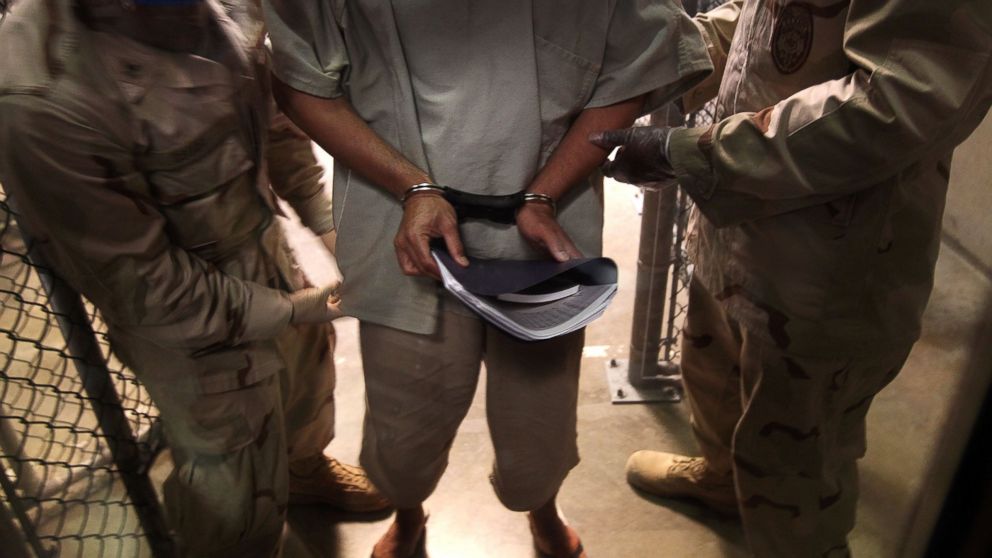Force-Feeding at Gitmo: Obama’s ‘Torture’ Debate
Critics say similar tactic from CIA torture report continues under Obama.

— -- The forced feedings of at least five detainees held at CIA black sites after 9/11 were among the most graphic new revelations in a declassified Senate report on the interrogation program released this week.
The procedures, described as “rectal hydration” and “rectal feeding,” have been criticized by the White House as “torture” and subsequently banned.
But leading human rights groups, including the United Nations Committee Against Torture, International Committee of the Red Cross and the World Medical Association, have accused the Obama administration of continuing a similar practice at the U.S. military prison at Guantanamo Bay.
When dozens of detainees went on hunger strike last year, some were strapped into restraint chairs and force-fed by U.S. military personnel.
CIA Torture Report: The Most Stunning Findings
Torture Report Reveals CIA's 'Brutal' Interrogation Tactics
CIA Torture Report: White House Mum on Whether Methods Saved Lives
“Force feeding of prisoners on hunger strike constitutes ill-treatment in violation of the Convention [Against Torture],” a U.N. human rights committee concluded late last month.
Others are equally critical.“Abuse at Guantánamo is still happening on Obama’s watch,” said Cori Crider of Reprieve, the U.K. human rights group, which is seeking court-ordered release of videotapes of the Guantanamo procedures. “I’ve seen the force-feeding footage to prove it.”
The White House and Pentagon vigorously dispute that the practice amounts to torture, saying the forced feedings at Guantanamo are humane and meant to prevent suicide. A federal judge earlier this year upheld the procedure, although she urged the military to consider alternatives.
Officials Cite Differences in CIA, Gitmo Force-Feeding
U.S. officials also note there are fundamental differences between the involuntary “feeding” procedures at Guantanamo and those described in the Senate Intelligence Committee report on CIA detainees.
Several detainees held at CIA black sites received “rectally infused” meals, according to the Senate report. Those at Guantanamo Bay are not fed rectally but instead given liquid nourishment through tubes inserted through the nose directly to the stomach, according to the Pentagon.
The Senate report also revealed that CIA operatives considered “rectal feeding” a “means of behavior control” and a way to “exert total control over the detainee.”
The CIA’s formal response to the report does not address rectal feeding, although the agency has defended rectal rehydration as a “well acknowledged medical technique.”
Former Vice President Dick Cheney said Wednesday that rectal rehydration “was not one of the authorized or approved techniques.”
The Pentagon says the feeding procedures at Guantanamo are used solely for suicide prevention.
“We’re in charge of safe-guarding [the detainees], which means that we will not let them harm themselves through refusing meals over extended periods of time,” Defense Department spokesman Lt. Col. Myles B. Caggins III told ABC News. “In no way is it torture to keep a person from harming themselves by having medical professionals ensure they have adequate nutrition through well-recognized safe feeding methods.”
President Obama has signed off on the Guantanamo forced feedings, telling reporters in April 2013 that, “I don't want these individuals to die.”
He has also defended the treatment of detainees at Guantanamo, telling Fusion’s Jorge Ramos this week that no torture has been condoned on his watch.
“I can categorically say that anybody who engaged in any behavior like this would be directly violating my executive orders and my policies as President of the United States, and would be held into account and would be breaking the law,” he said.
The White House says the recent hunger strike is another reminder of the need to shutter the facility, on which Obama campaigned in 2008 and remains committed to do.
“The continued operation of the Guantanamo Bay detention facility poses profound risks to our national security and must be closed,” National Security Council spokesman Patrick Ventrell said.




